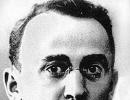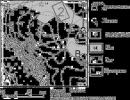Fedor the memorial: Signs and customs. From thoughts for every day, collected by Leo Tolstoy
People also call the day Fedor the Memorial Day. According to legend, Fedor was born in Constantinople and received an excellent education. The latter allowed him to emerge victorious from every dispute about Orthodoxy with the iconoclasts.
What day is it today? folk calendar and what it means: 2018
When Fedor became a monk, he settled in Sakkudion with his uncle. He later became rector, serving high example to others. On the path of the saint there was a lot of suffering and grief. But he continued to work miracles and help people.
Fedor the Memorial Day is one of the most mystical days of the year. It was believed that the deceased, missing their family and friends, could temporarily leave the afterlife and visit those who were dear to them. This was especially true for those who had not visited the graves of their ancestors for a long time and had not prayed for the repose of their souls.
Those who were afraid of meeting the deceased performed special rituals. For example, an ax was placed under the threshold, and crosses were painted on the doors. It also happened that a stranger was allowed home to spend the night in order to confuse the spirit. According to legends, it was possible to scare away the dead with a sprig of rowan or a bunch of nettles.
Don’t forget about church customs on February 8, 2018. A prayer service is ordered for Fyodor the memorial, and the house and yard are sprinkled with holy water.
On Fedorov's day, people ask for relief from pain in the chest and stomach.
Fedorov's day was also considered “pea day”. They used peas to tell the weather. Dry peas roll loudly on a saucer - to frost. Deaf - for snowfall.
If the weather for Fyodor the memorial is clear, without wind, then spring will come early and will be warm.
They honored St. Feodor on this day. The saint lived in the city of Constantinople and was known among the people as a highly educated and decent citizen. For his faith, Fyodor was imprisoned in prison, where for many years he did not speak with anyone except the dead. The point is that with early childhood he was endowed with the gift of mediumship. Young Fedor heard the voices of dead people and felt their presence. The long imprisonment helped him to reveal his talent given from above, because he could not communicate with anyone alive.
So, instead of ruining Fyodor, the dungeon helped him better understand himself, get to know another world. He learned to see souls wandering around the world of the living, and when they realized that he was able to see and hear them, they began to flock to him for help. He helped some to accept the fact of their death, while others calmed them down and helped them move to the other side.
When the government in Constantinople changed, Saint Theodore Stratilates was released. An old abandoned temple was given to him to manage. Fyodor was able to restore the shrine in a short time, and soon the Studiysky monastery was formed next to the temple. Saint Studite performed many miracles during his lifetime. People turned to him not only for help in the affairs of the dead, he helped to recover from serious illnesses and protect the house.
To this day, the saint works miracles through his icons. The icon of St. Feodor can help in many ways:
- Protect any building from fire;
- Release a deceased person;
- Maintain health for many years;
- Recover from a serious illness;
- Protect yourself from the wrath of wild animals.
Having his icon in your hands, you can perform many magical rituals and provide strong energy protection.
Traditions of the day
Fyodor's Day, the memorial man in Rus', was celebrated in a special way, in compliance with ancient Slavic traditions. It was believed that on this day the souls of dead people come to the world of the living and wander around it in search of their loved ones. According to Slavic beliefs, the souls of dead people move to a world called Nav. Nav is similar to the world of the living, souls live there and have their own responsibilities. Some live in Navi for a long time, others are reborn and live again in the world of the living, while others suffer, yearn and try to return to the world of living people by any means.
- Those who left ahead of schedule. Each person has his own life mission and his own life span. If life is interrupted suddenly, at an early age, due to an accident, it is difficult for the soul to accept its death and go to the world of the dead.
- Husbands and wives with surviving spouses. The same applies to lovers separated by death. One soul involuntarily reaches out to another, and such love does not recognize death.
- Those who have an unfulfilled mission. For example, if a person did not fulfill his paternal, maternal or fatherly duty, he abandoned his family in difficult times.
Sometimes a person passes away from his life at the time intended for him, but his connection with the living is so strong that he does not let his soul go into a quiet life in the world of spirits. It is these dead people who wander on the day of Fyodor, the memorial service, in search of their living relatives and close people.
To prevent the dead from disturbing the living, it was traditional to go to their graves and hold a funeral service. Such funerals must take place according to ancient Slavic rules, otherwise the soul of the deceased will not rest.
All relatives gathered and remembered those who had passed away with a kind word, remembered all the good things that a person had accomplished during his life, and thanked the deceased. They prayed to Fyodor Stratelates, asking him to protect the souls of their relatives from evil spirits, to grant them peace and humility with their death.
Embrace of the Dead
If on the day of Fyodor’s memorial the traditions regarding the funeral were not observed, dire consequences could arise for this; people called them “Embraces of the Dead.” In the Slavic calendar there were several days when the souls of the dead could come into contact with the living and influence the course of life in the human world. One of these days is Fedor the Memorial Day.
Souls who were worthily remembered found peace and did not harm the living. Those who scolded the dead, refused to remember their lives with dignity, offended the soul of the deceased - aroused anger in it. The embittered soul clung to a living person, took him into its deadly embrace, and did not let go until it took the living person to the grave.
The one who fell into the arms of the dead man suffered from nightmares, saw ghosts in reality, and felt his imminent death. All this led to depression and delusional states. Often a person ended up in a mental hospital. It is believed that if the soul of the deceased has imprisoned you in its arms, you need to buy a handful of nails at any market. Take these nails to the grave of the deceased and drive them into the grave soil, saying:
“Dead, I nail you to the world of the dead, I close the lid of your coffin, I drive you away from the world of the living. Your embrace will not torment me, I am alive - and only death will decide when I should run to the world of the dead after you.”
After this ritual, the soul of the deceased became powerless, the dead man unclenched his embrace.
Funeral traditions of the Slavs
Slavic commemoration is part of the funeral procession. At the moment of death, his entire family gathered at the bedside of the dying person - spouse, parents and children, blood brothers and sisters. They all prayed, looking at the flame of a candle, which was placed in advance near the head of the dying person. This ritual managed to save the soul from the fate of becoming an evil spirit. The Slavs believed that at the moment of death a person is overcome by demons, and if they manage to absorb the soul, the person does not go to the world of the dead, but becomes an entity of a lower order.
As soon as the soul left the body, the deceased was washed. Washing meant cleansing the body from defilement. In order for the soul to be comfortable in the world of the dead, its body had to be cleansed. They washed him with water collected from a clean spring or holy spring. It was not allowed to allow the relatives of the deceased to perform ablution; this task was performed by special people - washers. They took away all the things that were on the deceased at the time of his death. After washing, the deceased was dressed in new clothes. In Rus', it was customary to bury people in white or just light clothes, so that a person would come to the world of the dead renewed. They even dressed the poor; money from the whole village was collected for clothes for them, as alms for the deceased.
Afterwards the body was placed in a coffin, the dead man’s last home in the world of the living. In order not to take on the energy of death, they placed a person in a coffin not with bare hands, but with special mittens. Afterwards, these mittens were burned in a fire pit. The coffin was placed so that the face of the deceased looked directly at the faces of the saints and icons. At the moment of this procession, tears and other emotions were held back, the deceased was placed in the coffin in complete silence.
The home funeral took place in the family circle. Relatives sat at the coffin of the deceased and remembered him with kind words. It was believed that the more good words were said about him, the kinder his soul would be, and it would not torment the living. This rule was especially adhered to during the death of grumpy relatives, whose souls could be greatly harmed. A glass of water covered with bread was placed in front of the icons. If a funeral meal was planned, a glass of bread was placed in a separate place at the table. This showed respect for the deceased relative, he last time allowed to sit at the home table.
The coffin with the deceased was carried away from the house not by relatives, but by porters. They carried the deceased out feet first, trying not to touch anything in the house. If this did happen, this thing was placed in a coffin and buried with the deceased. The Slavs believed that this was the will of the deceased, and it was strictly forbidden to ignore the wishes of the deceased. Carrying the deceased out feet first is a tradition that is followed even today. This prevents the deceased person from leaving energy traces and returning back.
While the coffin was being lowered into the grave, loved ones had to cry, seeing off the soul of the deceased with tears. In Christian culture, the presence of a priest reading a prayer is required at a funeral. If the priest could not come, he had to be replaced by a person familiar with sacred prayers. In paganism, funerals are accompanied by chants dedicated to the goddess of death - Mara. They asked her for help for the deceased in the transition to another world.
When we arrived home we went to the bathhouse. Only after washing off the cemetery energy could one sit down at the table. After the funeral was over, the wake continued in the house. There, at a large table, the relatives of the deceased, neighbors and acquaintances gathered together, remembered him and told stories from his life. It was believed that this way the soul would be calm and could go into the world of the dead pure and peaceful. In the same cases, if they swore at the wake, my soul was tormented, I could not leave the living, I tried to stay and reconcile everyone.
A wake performed according to all the rules is a guarantee that the deceased will leave and will not bother the living. They should have been repeated several times a year: on Radonitsa, parent's Saturday and on the day of Fyodor - a memorial service.
Marilyn Monroe's strange habit of being late for filming was a peculiar sign, so the actress never arrived on time. If this happened, it only meant that she had mixed up the time.
What awaits you in the near future:
Find out what awaits you in the near future.
Folk signs on February 8
Common name:
Fedorov Day, Fedor the Memorial, the turn of winter, the wind.
Customs
On this date, you can tell your fortune about what spring will be like, because it determines how fruitful the year will be. To do this, take the peas, roll them around the dish and listen carefully: if they start to bounce off the plate and ring a little, then frost will hit, which is bad for the harvest; They ride silently - blizzards will cover the ground with a dense and warm blanket of snow, which will save future seedlings.
For those who have recently had an unfortunate theft, you can use the Bible to figure out which of the people you suspect did it. Prepare pieces of paper with their names and two notes with the words “The loss will be found” and “Those against whom you sin are innocent”, find the chapter about the prophet Elijah and put everything you have prepared there. After this, read the Lord’s Prayer three times, and then randomly pull out one of the pieces of paper. It is believed that the Bible itself should tell you the right answer.
Signs
- If a domestic cat sits on the windowsill and looks out the window, then a thaw is approaching.
- Familiar sounds are heard louder and clearer, which means that the weather will worsen in the near future.
- It's calm and clear outside - spring will be warm and come quite early.
On this day the name day is celebrated:
Interpretation of dreams February 8
- A dream of a funeral wreath foreshadows the dreamer's imminent onset of gray everyday life. If there was someone’s photograph in its center, then your hopes associated with this person will not come true. If you saw your own photo on it, know that this moment you have empty illusions about the new business.
- You dreamed of a huge powerful oak tree - good luck will smile on you soon. If the tree was uprooted, then the problem that has arisen can be prevented in advance.
- A dream in which you saw a dog or a wolf white, indicates that you will be lucky enough to receive much-needed help and support from your true friends.
Talismans
If you are in a bad mood and want to transform negative energy in the positive, then you need to wear jewelry made of translucent coil. However, one should take into account the fact that this stone is suitable only for those who are able not to chicken out in the face of many trials and temptations. In this case, he will give you the gift of foreseeing upcoming dangers and finding ways in advance to circumvent them.
Now the stars advise you to use one of the layouts suggested below. Don't miss your chance to find out the truth.
Folk omens for February 8 will tell you what the weather will be like in the near future. In the folk month, the date was called Fedorov day, Fedor the Studite, Fedor the memorial, Fedor the table, Pea day, the turning point of winter.
On February 8, the Orthodox Church honors the memory of Theodore the Studite (759-826), a Byzantine church leader. The Monk Theodore was made abbot of the Studite monastery in Constantinople in 798. He fought iconoclasm and left interesting theological letters and writings.
Theodore was the son of an official and a relative of Saint Roman the Sweet Singer. Under the guidance of his mother, he received a good education, and under the influence of his uncle Plato, abbot of the Sakkudion monastery, at the age of 22 he took monastic vows in this monastery. Theodore's young wife Anna also became a monk.

February 8: traditions and customs of the day
The name of the monastery, the abbot of which was Theodore, in the mind common man turned into the nickname of the saint himself - Theodore the Studite, which provoked a “decipherment” due to the rapprochement with the words of the native language - “cold”, “cold”, “cold”. This is how folk sayings associated with this day appeared: Fyodor Chills the earth.
It should be noted that in popular and church calendar There is another day dedicated to the memory of this saint - (the day of the death of St. Theodore). In February, the transfer of his relics, carried out in 845, is celebrated.
To Fyodor Studite, by popular belief, the deceased yearn for their loved ones and for native land. To calm them down, they sprinkled ashes on the fire and said: “ Orphan souls, don’t walk around the yard! Go to the west side, only there you will find eternal joy».
On this day they went to the cemetery, and also arranged a memorial table, on which ritual dishes were left overnight for the deceased “parents”.
Even February 8th was called “pea”. For the birthday boy, pea porridge was cooked, after tasting which he gained strength for the whole next year.
To prepare the ritual dish “pea porridge” you will need:
- 800 g dry peas;
- 1 PC. celery and carrots;
- 2 tbsp. spoons of butter.
Dry peas were boiled with roots and a little oil was added. As soon as it is cooked, you need to put it on a sieve and rub it to make a puree. You can add a little broth to the resulting mass. The dish is served with croutons.
On this day they guessed the weather by peas:
- if dry peas roll loudly across the dish, then there will be a bitter frost;
- if it’s quiet - to a quiet snowfall.
On this day, they made ties on the branches of dry aspen and made wishes. cherished wish, We believed that this would help him come true in the near future. Healers treated children and adults for epilepsy and seizures, charmed the hut from fire and read a conspiracy to leave the enemy alone.
February 8: signs and beliefs
- If a tit sings in the morning, it will soon get colder.
- The samovar is buzzing loudly - it means cold weather.
- The moon has a pale color - for snowfall.
- Clean sunset in frosty weather - to cold.
- A starry night means a good flax harvest.
Video: February 8 – Fyodor Studit, memorial service, feast
The national holiday Fedor the Memorial is celebrated on February 8, 2020 (the old style date is January 26). In the church calendar, on this day the memory of St. Theodore Studite, abbot, is honored.
Story
Theodore was from the city of Constantinople. He was able to receive an excellent, comprehensive education, thanks to which he successfully opposed the iconoclasts of other faiths in disputes about Orthodoxy.
Having taken monastic vows, Theodore settled in the monastery of Sakudion with his uncle. He was later chosen as rector for the high example of virtue he set. The saint had to endure much suffering, but both during his life and after it, the saint continued to work miracles.
Traditions and rituals
The national holiday Fedor the Memorial Day is considered one of the most mystical and mysterious days of the year. According to legend, on this day the dead, who really miss their family, loved ones and the earth itself, can leave the afterlife and visit living relatives. This is especially true for those who have forgotten about them, have not visited their graves for a long time and have not lit candles in the church for the peace of those who have passed on to another world.
To prevent this from happening, there are a lot of “home” rituals: an ax placed under the threshold, crosses drawn on doors and windows, a stranger allowed in for the night. It is believed that a foreign living soul in the house will confuse a guest from the afterlife.
If the deceased does not want to leave the living alone, you need to throw a bridle at him. He can also be scared away by a branch of rowan or a bunch of nettles hung on windows and doors. We should not forget about church rituals. On this day, it is worth ordering a prayer service and sprinkling the house and yard with holy water.
On this holiday they pray to Saint Theodore for relief from pain in the chest and stomach.
Signs
It is clear and there is no wind - spring will come early and will not be cold.
If peas scattered on a saucer roll loudly, it means frost, and if it is dull or completely quiet, it means there will be snowfall.






